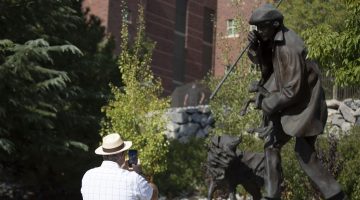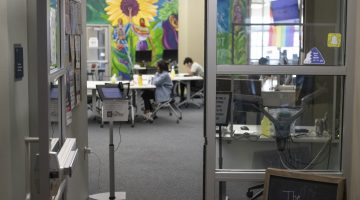
A police officer wears a body camera as he conducts a routine traffic stop on Friday, Feb 2. The Reno City Council voted to approve funds for body cameras for the Reno Police Department.
University Police Services will join other Northern Nevada organizations and the rest of the country for National Prescription Drug Take Back Day on Saturday, April 28. The national event is put on twice a year to prevent and educate about prescription drug addictions, as well as provide a safe place to dispose of unused medication.
University Police Services will be collecting prescription drugs from 10 a.m. to 2 p.m. on the day of the event in front of Lawlor Events Center. There are also drop-off locations at local grocery and convenience stores.
Items such as unused prescription drugs in the original bottle with the label on, liquid prescriptions and pet medications will be accepted as part of the round-up.
Those who are unable to bring their prescriptions on the day of the event can also drop them off during normal business hours at permanent drop-boxes at the Reno Police Department, Sparks Police Department, Washoe County Sheriff’s Office or University Police Services.
University Police Services also encourages those who cannot or do not want to drop off their prescription drugs to crush the remaining drugs in a sealable plastic bag and pour cat litter or coffee grounds in the bag before disposing of it.
In 2014, it was estimated that over 2 million Americans were addicted to prescription drugs.
“The abuse of and addiction to opioids such as heroin, morphine, and prescription pain relievers is a serious global problem that affects the health, social, and economic welfare of all societies,” the National Institute of Drug Abuse website said.
The NIDA associates this escalating number of addictions with the increase of prescriptions written by doctors across the country. In 1991, around 76 million prescriptions were written while in 2013, that number increased to 207 million.
This increase in availability of prescriptions has led to an increase in medical emergencies and overdoses related to prescription drugs. From 2004 to 2008, emergency room visits related to prescription drug abuse more than doubled from 145,000 to 305,000 visits. Overdose deaths also increased to more than 16,000 in 2010.
Prescription drugs are abused because they have the same effects on the body as other criminal substances.
“Because prescription opioids are similar to, and act on the same brain systems affected by, heroin and morphine, they present an intrinsic abuse and addiction liability, particularly if they are used for non-medical purposes,” said the NIDA website.
If you or someone you know at the university is struggling with prescription drug abuse or any other addictions, visit the UNR Drug Prevention and Treatment Services website for information on how to receive counseling and other services.











